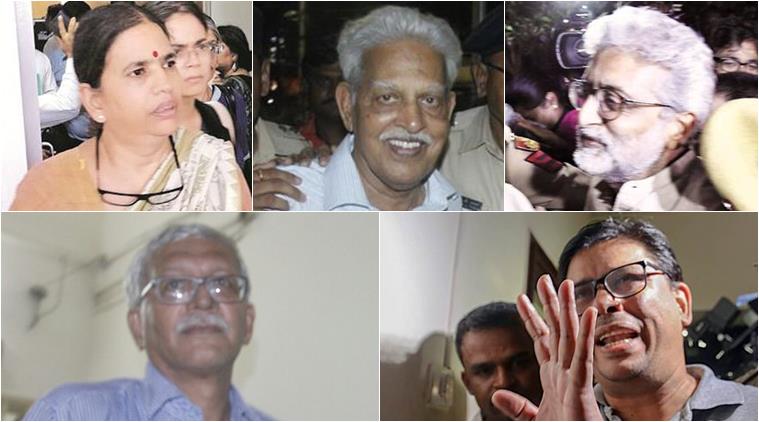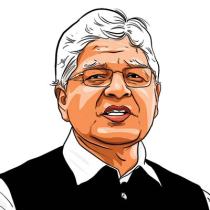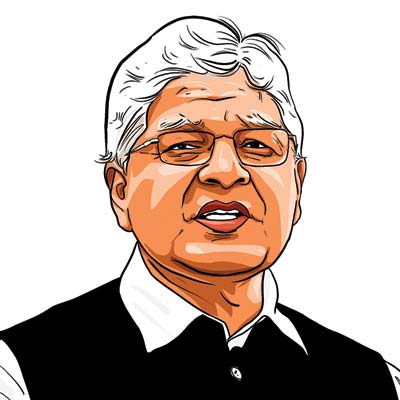A nation’s moment of reckoning
The arrest of human rights activists is a test for India’s people and its institutions

Pune police arrested (Clockwise) Sudha Bharadwaj in Faridabad, Varavara Rao in Hyderabad, Gautam Navlakha in New Delhi, Vernon Gonsalves and Arun Ferreira in Mumbai.
The course of democracy anywhere in the world is defined by events that test its resilience and also add to it. The August 28 arrests of some of the country’s most respected human rights activists is one such watershed event which will test the will of the Indian people to assert their freedom and the capacity of libertarian institutions to resist the state’s onslaught on the republic’s core values.
While the Supreme Court (SC) has interdicted the detention of the accused in jail, their house arrest is only a limited consolation. The truth is that the accused will have to face a never-ending oppressive prosecutorial process which, once initiated, consumes life and is destructive of one’s pride, dignity, and humanity. We cannot, therefore, let this moment pass without registering the force of the nation’s collective conscience to resist injustice against those who have chosen the path of service and commitment to social causes. Their life’s work and the well-documented surrounding circumstances of the arrests proclaim their credentials and a presumption of innocence qua the charges.
While an attempt has been made by prosecuting authorities to link the arrests with the alleged “Maoist plot to assassinate the Prime Minister”, the case presented to the courts for transit warrants reportedly goes no further than alleging a case of incitement to violence through inflammatory speeches and historical references. The allegedly inflammatory exhortations are with reference to a plea to revolt against injustice in the backdrop of the Bhima-Koregaon violence during a Dalit March in January this year, which was preceded by a meeting of the Elgaar Parishad under the patronage of former Supreme Court Judge P B Sawant and a former judge of the Bombay High Court Justice Kolse Patil, both of whom see no legal justification for the arrests.
The observation in the SC of Justice Chandrachud that “dissent is the safety valve of democracy” is a clear reiteration of the citizens’ right to differ and disagree. This is the philosophy that inspired our freedom movement and defines India’s constitutional democracy predicated on the people’s right to call state power to account, albeit within the constitutional framework.
Unlawful detention with its accompanying injustices, including the innumerable instances of custodial torture, mock the promise of our dignitarian Constitution and rob citizens of their self-worth and dignity. The routine constitutional aberrations under the present dispensation are indeed an ominous portent. Charges of sedition against student activists in the past, the persecution of political opponents on trumped up charges, cases against office bearers of inconvenient NGOs and a brazen display of the state’s iron fist are reminiscent of the ways of dictatorial and colonial regimes.
The arrests of Sudha Bharadwaj, Gautam Navlakha, Varavara Rao, Vernon Gonsalves and Arun Ferreira — lawyer, journalist, poet and rights activists, respectively — would serve a national purpose if, rising above partisan considerations, we can galvanise ourselves as a nation and hold aloft the torch of freedom. A nation born to freedom is expected to vindicate the supreme sacrifices made by its freedom fighters so that we may enjoy the fruits of liberty, of which eternal vigilance is the price. We cannot ignore the defining lessons of history, which find an echo in the immortal words of Dante that “the hottest places in hell are reserved for those who, in a period of moral crisis preserve their neutrality” and in Ram Dhari Singh ‘Dinkar’’s celebrated verse “Samar shesh hai/ Nahin paap ka bhagi keval vyadh/ Jo tatasth hain/ Samay likhega unka bhi apradh” (The criminal alone is not responsible for the crime. Time will also record the crime of those who are neutral/indifferent to it).
Historically, totalitarian movements and dictatorial regimes have their genesis in exaggerated threats to national security. Invariably, fundamental freedoms thus encroached upon in the name of security are seldom restored to their holders without an upsurge. Our own struggle for freedom was rooted in the conviction that a subject nation has a right to revolt, for which our founding fathers adopted peaceful means. How, then, can the Indian state, anchored in the promise of constitutional democracy and committed to the preservation of fundamental human freedoms, unjustly invoke oppressive laws against its own citizens crusading against social and political inequities?
Considering the stringent provisions of the Unlawful Activities (Prevention) Act (UAPA), under which the rights activists have been charged, it is hoped that the SC will insist upon the utmost circumspection on the part of the prosecuting agencies in pressing ahead with the prosecution.
A nation that seeks continuing inspiration in its folklore of elevating nationalism associated with poets such as Ram Prasad Bismil, Allama Iqbal, Ashfaqullah Khan, Firaq Gorakhpuri, ‘Dinkar’ and Durga Sahai ‘Suroor’ cannot remain impervious to injustice, social or political. A verse by Allama Iqbal will remain relevant as long as our goal of establishing a just and humane social order remains an ongoing national enterprise: “Utho! Meri duniya ke ghareebo ko jaga do, kakh-e-umra ke dar-o-diwar hila do, jis khait se dehqan ko mayassar nahin rozi, uss khait ke har khosha-e-gandum ko jala do” (rise and wake up the poor of the world; shake the doors and walls of the mansions of the great; burn every stack of wheat from the field which does not yield a livelihood to farmers). We know that tyranny expands in proportion to the space available for its existence. By standing up against injustice we accept the burden of being and indeed, it is better to be than not to be.
The writer is former Union minister for Law & Justice
For all the latest Opinion News, download Indian Express App
More From Dr Ashwani Kumar
- Dear prime minister, we must enactTo live up to constitutional values, commitments made in international fora, India needs standalone legislation against custodial torture...
- Evidence vs perceptionThe 2G verdict asserts inviolability of procedural justice and is a triumph for principles of fair trial...
- Failing the fairness testThe legality of Manmohan's summoning order will be tested on the touchstones of our constitutional and criminal jurisprudence...








































No hay comentarios:
Publicar un comentario